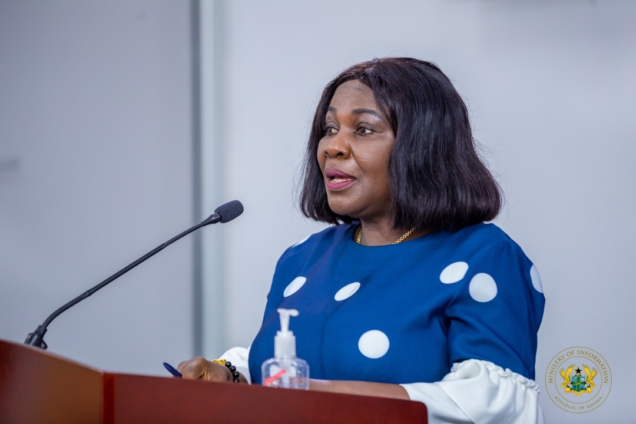The Minister for Sanitation and Water Resources, Cecilia Abena Dapaah says the ongoing water rationing in the country is due to galamsey and sand winning activities near river bodies and catchment areas.
Speaking on the floor of Parliament on Thursday, the Minister said illegal sand miners in their bid to create access for their trucks to win sand along river beds, fill river channels with sand whiles some galamseyers dump solid and liquid waste into the rivers.
The situation, she said, has led to a deficit in water production and poor water quality resulting in water rationing.
“There is sand winning going on in the Weija catchment area and this has contributed to increased turbidity with its production cost. Compounding this issue is the illegal dumping of solid waste in the river due to the encroachment within the catchment area. Illegal mining and farming activities within the Daboase river catchment has led to filtration of the intake…This has therefore led to a reduction in the production of water leading to the current water rationing regime in place.”
According to the Minister, 35 per cent of the volume of water extracted currently cannot be treated and it’s returned into the river as wastewater.
She noted that aside from the sand wining and galamsey activities, other operational challenges faced by the various water plants include; intermittent power supply and obsolete mechanical equipment.
Cecilia Abena Dapaah observed that a series of measures have been put in place to address the water rationing including the replacement of weak pipelines to ensure sustainable water production throughout the year.
“Mr. Speaker the Ghana Water Company Limited intends to utilize the signment plant at Kpone to its full capacity to transport 15000 cubic metres per day of treated water for distribution. It intends to also activate the idle capacity at the Kpone new water treatment plant to transport an additional 21000 cubic metres per day of treated water for distribution,” she said.
The Minister also disclosed that the government by the end of this year will install across the nation automated voltage regulators to stabilise power supply at various treatment plants.
The Ghana Water Company Limited (GWCL) in January this year assured consumers that it is working to address the erratic water supply being experienced in some parts of the country.
In a statement signed by the company’s Head of Public Relations and Communications, Stanley Martey, GWCL acknowledged the complaints from consumers, “especially in the Greater Accra, Ashanti, Central, Western and the Northern Regions”.
Commenting on the cause of the challenge, the GWCL said “the impact of the dry season on the raw water sources, has been compounded by activities of illegal alluvial mining, popularly known as galamsey and we wish to assure the general public that, the company, together with the Ministry of Sanitation and Water Resources, are working assiduously to improve on water delivery in the country.”
Latest Stories
-
Insinuating Bagbin is not heeding calls for recall because he is NDC unfounded and unfortunate – Parliament
14 mins -
Ashanti, Nelly are engaged and expecting a baby
1 hour -
New Ghana train on test run involved in accident
1 hour -
World Bank, AfDB partner to provide 300m African’s with electricity access
1 hour -
Ghana wins preliminary ruling in Cassius Mining’s $300m international arbitration
1 hour -
Ghana’s revenue-to-GDP ratio to exceed 17% within next six years, but expenditure to remain flat – IMF
2 hours -
Gborbu Wulomo didn’t marry Naa Okromo – Chieftaincy Minister
2 hours -
Oquaye Jr. says he’s undeterred by ‘propaganda’ twist to viral laundry video
2 hours -
Ghana’s debt-to-GDP ratio to tumble to 69.7% in 2029 – IMF
2 hours -
Interior Ministry imposes 4pm to 7am curfew on Sampa
2 hours -
Child marriage: Teenage girl to be released to her family – Gender Minister-designate
2 hours -
Naa Okromo is 15 years old, still a virgin and not married to Gborbu Wulomo – Government
3 hours -
GhIE condemns intervention by Ashanti Regional Minister in ECG Affairs; commends ECG GM for upholding regulatory standards
3 hours -
GPL: Asantehene tasks Asante Kotoko to do ‘better’ after crucial meeting
3 hours -
Why Sam Jonah can’t trust Ghanaian journos to cover Election 2024 professionally
3 hours

